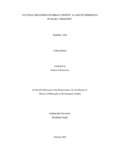
Please use this identifier to cite or link to this item:
https://hdl.handle.net/20.500.14301/554| Title: | Cultural Belonging in Urban Context: A Case of Indigenous Hyolmo Community. |
| Authors: | Lama, Angnima |
| Citation: | Lama,A. (2025).Cultural belonging in urban context: A case of indigenous Hyolmo community. |
| Issue Date: | Oct-2025 |
| Publisher: | Kathmandu University School of Education |
| School: | SOED |
| Department: | DODE |
| Level: | M.Phil. |
| Program: | MPhil in Development Studies |
| Abstract: | Culture is a way of communicating the intrinsic relationship with the natural, spiritual, and social world. It's practice of rituals and the use of different symbols, signs, elements and marking day and date therefore holds a deeper meaning in communicating the worldview and traditional lifeways. However, these deep values that strengthen the relationship of Indigenous peoples with their community and places are in peril as more people are migrating to the urban centers. The increasing mobility to the urban space and the grand design of modernity has posed a threat to the indigenous culture. Culture, when it is replicated in the urban environment, is affected by the social, economics, politics, and urban architecture leading to the loss of communality and increasing feeling of not belonging. This study applies Indigenous research methodology in explaining how the Hyolmo communities are perceiving the shift and in response to that how are they negotiating their belonging. This study uses figuration theory and resonance theory to explain the cultural structuration in the urban centers and the ways the communities are forging attunement with the urban dynamics. The insights suggests that the urban conditions; political, economic, social and structural dimension are eroding the Indigenous culture, as they impede the practices of the culture in the same sense. The demanding urban work culture, meaningless competition, consumerism–– neoliberal projects are the major factors affecting how, when, where the culture is practiced. Nevertheless, Hyolmo communities continues to resist assimilation, forge alliances, claim spaces and assert their presence in the urban space. This study adds to the literature on the Indigenous Hyolmo community and cultural shift in this accelerated time and offers insights on Indigenous resistance in the modern time. This study applies relational accountability as a research paradigm, where relation is both the knowledge and ways of knowing, and accountability is a way of maintaining ethics and is methodology (way of unpacking the relationship). Different Indigenous Hyolmo methods of knowing, such as Tongba tum, Chhepa (cultural survival), are used to understand the relationship of the Indigenous Hyolmo community. Reflexivity and community engagement in the research process further enhance the reliability of this research. |
| URI: | https://hdl.handle.net/20.500.14301/554 |
| Appears in Collections: | Dissertations |
Files in This Item:
| File | Description | Size | Format | |
|---|---|---|---|---|
| WCC 7th Nov CULTURAL BELONGING IN URBAN CONTEXT.pdf | 732.12 kB | Adobe PDF |  View/Open |
Items in DSpace are protected by copyright, with all rights reserved, unless otherwise indicated.